The opening of the 18th annual conference of the Adult Education Center entitled Adult Education and Entrepreneurship in the Arab World
The activities of the 18th annual conference of the Adult Education Center entitled (Adult Education and Entrepreneurship in the Arab World), organized by the Adult Education Center at Ain Shams University, were launched in the presence of Prof. Dr. Nevin Al-Kabbaj, Minister of Social Solidarity, Prof. Dr. Hesham Tamraz, Vice President of the University for Community Service and Environmental Development Affairs and Chairman of the Board of Directors of the Center, Dr. Ashour Omari, President of the General Authority for Adult Education, Prof. Dr. Reda Hegazy, Deputy Minister of Education and Technical Education for Teachers' Affairs, Prof. Dr. Gehan Ragab, Advisor to the Vice President for Community Service and Environmental Development Affairs, and Dr. Islam Al-Saeed, Director of the Adult Education Center at the university, and conference rapporteur.
Dr. Neven Al-Kabbaj, Minister of Social Solidarity, indicated that universities are not only educational institutions, but rather play a prominent role in community development efforts and the efforts of comprehensive development convoys, explaining that education and knowledge are a human right, referring to the human rights strategy launched by the state and includes a set of strategies that apply to Ground.
Al-Kabbaj noted that they are working on two main factors: poverty and illiteracy, noting that poverty is not only material, but also consists in a lack of awareness and awareness of the problems surrounding society.
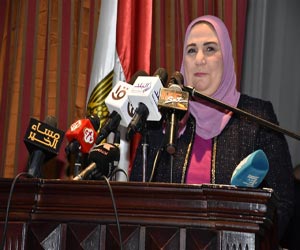 |
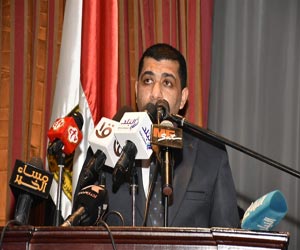 |
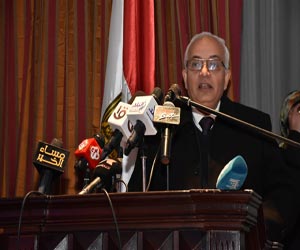 |
||
Her Excellency emphasized that illiteracy and overpopulation are two ghosts that eat away at what development achieves, as the uneducated individual lacks awareness of many issues, which affect the quality of life of the citizen.
Her Excellency also reviewed the Ministry's efforts in the field of combating illiteracy, as it focused on the areas of illiteracy, education and societal change through the Dignified Life Initiative, explaining that the illiteracy rate is 32% for males and 40% for females, noting that the age group from 15 to 40 years is the percentage. least in illiteracy.
It also indicated that the governorates of Qalyubia, Suez, and Ismailia have the highest rates of illiteracy.
She highlighted the President Abdel Fattah El-Sisi's interest in primary education, which is why 1,100 nurseries were developed, in addition to interest in developing mothers and children to address multidimensional poverty.
Regarding the Solidarity and Dignity Program, Prof. Dr. Neven Al-Qabbaj stated that the age of solidarity was raised to the age of university, provided that they enter and attend schools, which led to an increase in the attendance rate in schools to 99.8%.
In the previous year, the Ministry assisted civil institutions in developing 1100 community schools for those who missed the school age, in addition to 500 community schools, as well as persons with disabilities through vocational training centers and the establishment of social solidarity units in all universities with grants for outstanding students, in addition, there are more than a million students with families who support them who have been completely exempted in schools, as well as attention to the 100,000 women community leaders in charge of public service.
Furthermore, she announced the granting of a Public Service Pass certificate to those who literacy 10 children, in addition to an exemption from half of the loan for women taking loans if they eradicated their illiteracy.
Prod. Dr. Reda Hegazy, Deputy Minister of Education and Technical Education for Teachers' Affairs, pointed out that adult education and literacy is a locomotive for development, adding that the university's award of the Confucius Prize is the best evidence of the progress of the literacy and adult education project in Egypt.
He stressed that in the light of the Industrial Revolution, there will be a change in professions, pointing out that the efforts to eradicate illiteracy are tangible, calling for the need for curriculum maps and the preparation of an educational curriculum and a special educational development approach, pointing out that the government is responsible for planning and follow-up, while the executive role is the responsibility of civil society.
He added that entrepreneurship needs creativity and continuous growth, so work must be done to increase the self-confidence of adults in order to be able to develop and form an innovative vision to achieve creativity.
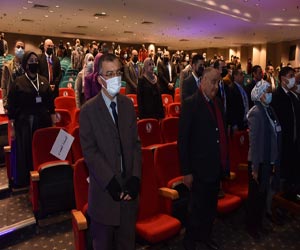 |
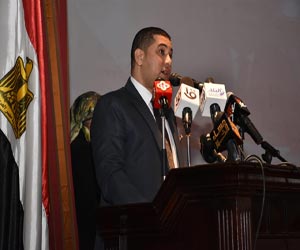 |
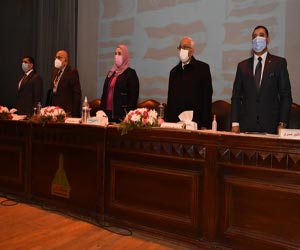 |
||
Dr. Hesham Tamraz, Vice President for Community Service and Environmental Development, said that all countries attach great importance to the file of entrepreneurship, which is reflected in its achievement of sustainable development, and in this context, entrepreneurship has become a strong and expressive field towards achieving sustainable development goals, because of its positive impact within the business community. As well as its ability to provide realistic solutions in line with all economic problems and challenges.
This interest was reflected in educational institutions in general, and adult education institutions in particular. After what was meant by the concept of literacy - in the past - teaching people the skills of reading, writing and arithmetic to be used in certain circumstances; The meaning of the concept of literacy has changed dramatically, as it requires learners to acquire new skills so that they do not become illiterate, and attention has become to the concept of adult education in its comprehensive sense.
From this standpoint, the ambitious plan presented by the President of the Arab Republic of Egypt (Sustainable Development Plan 2030), which aims to invest the available capabilities in the field of adult and young education alike, to achieve the desired educational goals in the shortest time, with the highest quality, and at the lowest cost as well.
Accordingly, the idea of the eighteenth annual conference of the Center for Adult Education, Ain Shams University came under the title: (Adult Education and Entrepreneurship in the Arab World), which focuses on developing adult education programs in the Arab world, and presenting directions, plans and programs that ensure linking the adult education movement with the requirements of adult education. sustainable development.
Prof. Dr. Ashour Omari, head of the General Authority for Adult Education, explained that the conference is the only one in the Arab countries that discusses adult education and learning issues, and its topic comes as an urgent topic at the present time, and is in line with global trends and the vision of the Egyptian leadership that seeks to achieve Egypt’s 2030 vision, as local reports indicate The global unemployment rate has risen as a result of technological development and the advent of the Fourth Industrial Revolution.
Hence the importance of a good and comprehensive education system, which UNESCO called for as one of the sustainable development goals in order to combat poverty.
With regard to what is called capacity poverty and developing the capabilities and skills of entrepreneurship among adults through mental training related to the needs of the labor market, which contributes to providing job opportunities, eliminating unemployment and enhancing the competitive capabilities of the Egyptian and Arab society, the General Authority for Adult Education has adopted many development projects that Represented in training on handicrafts and small, medium and micro industries, as well as modifying curricula and methods of methodologies concerned with vocational training and entrepreneurship that suit all needs. Several cooperation protocols were signed, such as the cooperation protocol with the Small, Medium and Micro Enterprise Development Authority of the Council of Ministers, which works in 11 governorates with the aim of eradicating orthographical or functional illiteracy, in addition to literacy projects spread throughout Egypt, in addition to cooperation protocols with all Egyptian universities.
He also indicated that in 2021, 410,000 citizens were literate, and in the first month of 2022, 500,000 citizens were literate.
Dr. Islam Al-Saeed, Director of the Adult Education Center at the university, and the conference’s rapporteur emphasized that the progress of nations is measured by their qualified human wealth capable of facing the challenges of the times. Therefore, adult education and its issues are witnessing great interest at the international, regional and local levels. Many international reports indicate the importance of investing in adult education as a human force, as one of the solutions offered to empower, rehabilitate and provide them with scientific and life skills.
He referred to what was confirmed by UNESCO and the United Nations Development Program about the rapid increase in the demand for skills necessary for the labor market, as well as the importance of linking all formal and informal institutions, and the importance of providing adults with technical, vocational, and entrepreneurship skills, which leads to Improving the individual's livelihood and the harmony of work and life in a way that contributes to sustainable and egalitarian societies.
He added that the conference presents the ideas and visions of experts and researchers from various Arab countries on best practices in developing entrepreneurial skills for adults; Confirmation of the political leadership’s commitment to investing in people and searching for opportunities outside traditional channels, and then achieving success based on merit, effort, and acumen, which leads to the involvement of adults in the pursuit of opportunities in the labor market, either by joining self-employment or undertaking projects It relies on the assistance of others, to raise awareness of career opportunities, as well as guiding them to ways in which they can contribute to the development and prosperity of society, thus reducing violence, marginalization and poverty.
It is worth noting that the conference will discuss four main themes:
The first theme: Entrepreneurship and the development of adult education programs in the Arab world.
The second theme: Entrepreneurship and the future of adult education institutions in the Arab world.
The third theme: adult education and sustainable development for adults in the Arab world.
The fourth theme: entrepreneurship and management of small projects for adults.
It also includes seven scientific sessions, spread over three days, including: (basic and reference working papers, research, and experiences of some entrepreneurship companies and local, Arab and African bodies in the field of adult education), in addition to holding two workshops in support of young researchers.


.svg)




